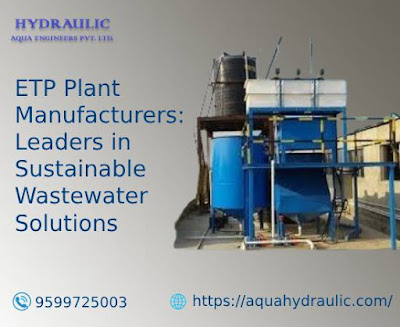ETP Plant Manufacturers: Leaders in Sustainable Wastewater Solutions
In the quest for sustainable industrial practices, Environmental Treatment Plant (ETP) manufacturers play a pivotal role in ensuring responsible wastewater management. As industries continue to grow, the need for efficient and eco-friendly solutions to treat and recycle wastewater becomes increasingly crucial. In this blog, we will delve into the significance of ETP plants, their role in environmental stewardship, and the key considerations for businesses when choosing ETP plant manufacturers.
Understanding ETP Plants:
Environmental Treatment Plants, commonly known as ETP
plants, are advanced wastewater treatment systems designed to remove pollutants
and contaminants from industrial effluents before they are released into the
environment. These plants are tailored to the specific needs of different
industries, ensuring compliance with environmental regulations and minimizing
the ecological impact of industrial processes.
The Role of ETP Plant Manufacturers:
1. Customized
Solutions:
ETP plant
manufacturers work closely with industries to design and implement
customized wastewater treatment solutions. By understanding the unique
characteristics of each industry's effluent, manufacturers can create ETP
systems that efficiently target and remove specific pollutants.
2. Compliance and
Regulatory Adherence:
With environmental regulations becoming increasingly
stringent, ETP plant
manufacturers ensure that their systems meet and exceed compliance
standards. This not only helps industries avoid legal consequences but also
contributes to the overall environmental well-being.
3. Resource Recovery:
Modern ETP plants are not just about treating wastewater;
they also focus on resource recovery. Manufacturers incorporate technologies
that allow for the extraction of valuable resources from wastewater, promoting
a circular economy and reducing the overall environmental footprint of
industrial activities.
4. Energy Efficiency:
ETP
plant manufacturers are also investing in energy-efficient technologies
to minimize the environmental impact of wastewater treatment. Implementing
renewable energy sources, optimizing processes, and incorporating smart
technologies contribute to the sustainability of these systems.
Considerations for Businesses:
1. Technology and
Innovation:
When selecting an ETP plant manufacturer, businesses should
look for companies that embrace cutting-edge technologies and innovative
approaches to wastewater treatment. This ensures that the system is not only
effective but also future-proof.
2. Life-cycle Cost
Analysis:
Assessing the life-cycle costs of an ETP system is crucial.
While the initial investment is important, businesses should also consider
operational and maintenance costs over the system's lifespan. A well-designed
and efficiently operated ETP plant can provide significant long-term cost
savings.
3. Environmental
Impact:
Evaluate the environmental impact of the ETP system itself.
Manufacturers committed to sustainability will incorporate eco-friendly
materials, energy-efficient components, and processes that minimize waste
generation.
Conclusion:
In a world where environmental consciousness is paramount, ETP plant manufacturers play a vital role in helping industries adopt sustainable wastewater management practices. By providing customized solutions, ensuring regulatory compliance, and embracing innovation, these manufacturers contribute to the preservation of our planet's natural resources and the well-being of future generations. Businesses that prioritize responsible wastewater management through collaboration with reputable ETP plant manufacturers not only fulfil their environmental obligations but also position themselves as leaders in sustainable industrial practices.




Comments
Post a Comment